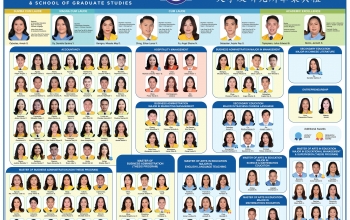BUSTAT - Business Statistics
This course serves as an introductory statistics for students majoring in any of the academic disciplines, whether it be sociology, psychology, economics, business administration, or one of the sciences. Elementary statistical concepts will be tackle that provide the necessary foundations for more specialized expertise in any area of statistical data analysis. It covers basic concepts and principles of statistics with emphasis on their applications and uses in the different fields of sciences, specifically in the field of business and economics. Knowledge of high school algebra is sufficient to comprehend the basic concepts that are presented.
Pre-requisite/s : NONE
Credits : 3.0 Units
QUANTI- Quantitative Techniques in Business
This 3-unit course will introduce students to deterministic and stochastic models in operations research. Students will learn to formulate, analyze, and solve mathematical models that represent real-world problems. In the first two-thirds of the course, deterministic models, in which no uncertainty exists, will be discussed. This section of the course will cover linear programming and the simplex algorithm, as well as related analytical topics. It will also introduce other types of mathematical models, including transportation, integer, and non-linear models. The remaining third of the course will cover stochastic models that handle the randomness inherent in most real systems. Topics will include inventory analysis, forecasting, and decision theory. The key emphasis is on problem formulation, model building, data analysis, solution techniques, and evaluation of alternative designs/processes in complex systems.
Pre-requisite/s : NONE
Credits : 3.0 Units
MACECO -Macroeconomic Theory & Practice
Macroeconomics is a preparatory course that introduces to the students the fundamental macroeconomic principles, concepts, and theories. It primarily deals with the macroeconomic goals like economic growth, full employment, price stability, trade balance, and redistribution of income with focus on the national income and how it affects the various sectors of the economy. It likewise explains to the students the business cycle and its effects on the economy as well as the two fundamental policies undertaken by government to stabilize the economy, that is, fiscal and monetary policies.
Pre-requisite/s : MICECO
Credits : 3.0 Units
PROMAN Production and Operations Management This course gives an overview of the techniques, methods, and processes involved in production management. It familiarizes students with core operational activities and covers measurement, purchasing, and production concepts and applications in manufacturing and service businesses. It will integrate the numerous activities and processes necessary to produce products and services in a highly competitive global environment. At the end of the course, students should have a deeper understanding of the role production/ operations management plays in the decision-making process.
Pre-requisite/s : PRIMAO
Credits : 3.0 Units
STRAMA - Strategic Management and Business Policy
The course deals with the basic concepts and applications in the field of Strategic Management. It exposes the student to the basic nature and character of top management decision-making, and gets him/her involved in the analysis, formulation, and implementation of corporate strategies and policies. Furthermore, it gives him/her the opportunity to apply basic concepts and techniques s/he has learned about the various functional areas of management.
Pre-requisite/s : PRIMAO, PRIMAR, HUREMA, MANACT, FINMA1
Credits : 4.0 Units
BUSLAW - Law on Business Organizations
This course is intended to give the students a broad knowledge of legal provisions governing business associations - limited liability company, partnership, and corporations. Topics include: nature of partnerships; elements and kinds of partnership; formalities required; rules of management, distribution of profits, and sharing of losses and liabilities; modes of dissolution; limited partnership; nature and classes of corporations; requirements for incorporation; powers of a corporation (expressed, implied, and incidental); Board of Directors; classes of stock; powers and obligations of stockholders; majority and minority controls; corporate reorganization (mergers, consolidations, and other business combinations); modes of dissolution and liquidation; and statutory books, records, and returns required for a corporation.
Pre-requisite/s :OBLICON
Credits : 3.0 Units
SAGLAB - Sales, Agency, Labor, and Other Commercial LawsThis course deals with the law on sales covering contracts for the sale of goods including nature, forms, and requisites, distinguished from dacion en pago, cession in payment, contract for a piece of work, and barter; earnest money as distinguished from option money; rights/obligations of vendee and vendor; remedies of unpaid seller; warranties; sale with a right to repurchase or conventional redemption and legal redemption; sale on credit; installment sales (personal-property- Recto Law, real property- Maceda law). It also covers the law on agency; its nature, form and kinds; obligation of the agent and the principal; and modes of extinguishments. Also discussed are employment contracts and pertinent provisions of the Labor Code and the law on credit transactions such as loan, deposit, guarantee, pledge, real mortgage, antichresis, and chattel mortgage. Other relevant laws on commerce and trade such as law on investments likewise discussed.
Pre-requisite/s :OBLICON
Credits : 3.0 Units
BUSTAX - Business And Transfer Tax
This course involves an intensive study of the business and transfer tax system, including the value-added tax, percentages taxes, estate tax and gift tax. The relationship between these business and transfer taxes are also emphasized. The policy underpinnings of wealth transfer taxation, and the reasons for the recent erosion in its political support, will be explored.
Pre-requisite/s :OBLICON
Credits : 3.0 Units
FINMA 1 -Financial Management 1
This course will cover an introduction to financial/corporate management. It will focus on what business firms should do to achieve their financial goal, which is to optimize the owner’s wealth. Specifically the course will include discussion of the finance function, the operating environment of finance, key concepts such as time value of money, risk and return, tools of financial statement analysis and planning, and financial asset valuation. As an additional part of the course, some selected personal financial management topics are also included in the course such as: use and source of credit from non-bank institutions, and an individual’s basic investment selection biases on ordinary shares, bonds, and mutual funds.
Pre-requisite/s : None
Credits : 3.0 Units
FINMA2- Financial Management 2
This course involves the study of the different financial techniques used in capital investment analysis and evaluation for making long-term financial decisions. Different sources of long-term funds, techniques in long-term financing and different ways of computing for values of long-term investments and returns will also be discussed. Key topics include the time value of money, capital budgeting, the cost of capital, leverage and capital structure, dividend policy, and mergers, LBO’s, divestitures, and business failures. Both qualitative and quantitative tools utilized in financial management shall be discussed and assessed as tools in management decision making.
Pre-requisite/s : FINMA1
Credits : 3.0 Units
FINACR 1 - Financial Accounting Part 1
This course is designed for the student who has completed the fundamentals accounting courses. It covers topics on accounting and its environment, the conceptual framework for financial accounting generally accepted principles, the recognition, measurement, and statement presentation of asset items in the balance sheet. The course also deals with the current trends in accounting for balance sheet and income statement items based on Philippine Financial Reporting Standards (PFRS) set by the Financial Reporting Standard Council. It requires the development of greater in-depth understanding, higher level of analytical and critical thinking in the student.
Pre-requisite/s : FACCT2
Credits : 6.0 Units
FINACR 2 - Financial Accounting Part 2
This course is a continuation of Financial Accounting Theory and Practice, Part I. It is designed to cover the financial accounting principles relative to recognition, measurement, valuation, and financial statement of presentation of liabilities and stockholders’ equity, including disclosure requirements. The related internal control, ethical issues, and management of liabilities and owner(s)’ equity are also covered. It also deals with contemporary issues such as accounting for changing prices, leases, employees’ retirement benefits, deferred taxes, and other current related items.
Pre-requisite/s : FINACR1
Credits : 6.0 Units
FINACR 3 - Financial Accounting Part 3
This course is a continuation of Financial Accounting and Reporting Part 2. It deals with the preparation of a properly classified balance sheet, income statement, statement of changes in equity, and statement of cash flows, including the required disclosures and notes to the financial statements. It also covers the reconstruction of accounts from incomplete records, change from cash basis to accrual basis of accounting, correction of errors, accounting changes, discontinued operations, earnings per share, accounting for changing prices, interim reporting, segment reporting and other current related items. The students will also be exposed to the financial statements of specialized industries.
Pre-requisite/s : FINACR2
Credits : 3.0 Units
FINACR4- Advanced Financial Accounting / Reporting 1
This is a 3-unit course that deals with specialized accounting problems likely to be encountered by accountants. The study of the various topics in this course is based upon fundamental valuation accounting and accounting theory as applied to special income and expense recognition methods and expanded business operations.
Pre-requisite/s : FINACR3
Credits : 3.0 Units
GOVNPI - Accounting For Governmental, Non-Profit Entities
This is a 3-unit course that deals with the study of business combination - merger and consolidation, consolidated financial statements of affiliated companies; foreign currency transactions; government accounting system; and non profit organizations.
Pre-requisite/s : FINACR4
Credits : 3.0 Units
CACMA 1 - Cost Accounting 1
This course is designed to orient the students to the cost accounting and cost management framework of business. Topics discussed are: overview of cost accounting; job costing systems; accounting, planning, and control for materials, labor, overhead and standard costing.
Pre-requisite/s : FACCT2
Credits : 3.0 Units
CACMA 2 - Cost Accounting 2
This is a 3-unit course that deals with the study of basic principles of cost accounting applicable to process cost system; procedures and methods of accounting for materials, labor and overhead; preparation of cost financial statements. The study of joint cost and by product, activity based costing and just in time costing will also be tackled.
Pre-requisite/s : CACMA1
Credits : 3.0 Units
MACT01 - Management Accounting, Part I
This course is designed to acquaint students with the role of the accountant in the management team by providing and assisting in the analysis, interpretation, and forecasting of business organizations. It covers the discussion of the foundation of management accounting; its expanding role, organizational structure, and professional ethics for management accountants; design of management accounting systems (e.g., responsibility accounting system), evaluating the impact of changes in business structure, functions, and appropriateness of management accounting techniques and methods; performance measurement for planning and control such as: marginal, absorption, and opportunity costing; cost behavior; cost-volume-profit relationship; advanced analysis and appraisal of financial and related information; business planning and budgetary systems; standard costing and variance analysis; quantitative techniques; and methods for planning and control.
Pre-requisite/s : CACMA1, CACMA2, FINMA1
Credits : 3.0 Units
MACT02- Management Accounting 2
This is the second part of Management Accounting and deals with the application of techniques and concepts focusing on segment reporting, profitability analysis, and decentralization; information for decision-making purposes (short-term and long-term) and non-financial indicators such as productivity per employee or per service unit; decision making affecting short-run operations of the company; capital budgeting decisions; and environmental cost accounting.
Pre-requisite/s : MACT01
Credits : 3.0 Units
MANCON- Management Consultancy This course covers basic considerations of management consultancy engagements by CPAs; areas of management consultancy, professional attributes of management standards, and ethical considerations. It also covers project feasibility – aspects of project development cycle, economic aspect, technical aspect, financial aspect (investment cost, financing, evaluation); information system (IS) engagement, management/operations audits, and business process improvement/reengineering. Together Business Policy and Strategy, this course serves as an integrative course to be taken in the last term/semester.
Pre-requisite/s : MACT02
Credits : 3.0 Units
APLAUD - Applied Auditing
This course deals with the application of the auditing standards, techniques and procedures in the practice of a typical independent audit on a medium-size service, trading and manufacturing business organizations. The course is geared toward providing students the ability to plan and perform an audit, analyze data for possible error and irregularities, formulate adjusting entries, resolve audit issues, prepare audit working papers and complete the audit including the preparation of the audit report. In all the areas included, the students shall also apply the auditing principles from PSAs and other regulatory laws and regulations during the course of study.
Pre-requisite/s : PRACT01
Credits : 6.0 Units
INTAUD - Internal Auditing & Related Assurance Services
This course will an in-depth understanding of the concepts associated with audits that go beyond the traditional financial audit. These audits have been described by various names such as: operational audits, program audits, management audits, and performance audits. The initial focus will be on the theory of performance auditing, followed by an approach to auditing management activities. This will include audit planning, selecting audit targets, preparing audit programs, implementing the audit and communicating audit results. The secondary focus will concentrate on the audit process of various management activities.
Pre-requisite/s : FINACR2
Credits : 6.0 Units




.jpg)




.jpg)
